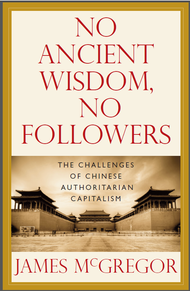 Cathy McGregor James McGregor, author of “No Ancient Wisdom, No Followers.”
Cathy McGregor James McGregor, author of “No Ancient Wisdom, No Followers.”
Book Chat
Talking with authors about their work.
In his book “No Ancient Wisdom, No Followers,” the author James McGregor delivers a sharp critique of China’s recent development path, and what he calls “authoritarian capitalism.”
In Mr. McGregor’s China, the government plays too large a role in the economy, and big state-owned entities dominate because of government subsidies and preferential treatment. Private entrepreneurs and multinational corporations are at a distinct disadvantage, one that he argues is likely to damage China’s prospects in the long run. With China determined to create its own global brands, he says, the government is putting rules and regulations in place that seem increasingly protectionist.
A former reporter for The Wall Street Journal who has spent more than 20 years in China, Mr. McGregor now works as a senior counselor for APCO Worldwide, a global communications consultancy. His book, in paperback and e-book format, was published late last year. He talked about it in an e-mail interview, which has been edited for style.
How did you come to write this book?
My interest in this book was fueled by the 10th anniversary of China’s joining the World Trade Organization and seeing China heading in a much different direction than had been anticipated. Instead of pursuing further market reforms and expanding the role of private enterprise, China had turned back to state-owned enterprise and begun strong-arming multinationals to hand over their most advanced technology to their state-owned business partners. I wanted to dig deeper into this situation while stepping back to look at the overall picture of where China had come from and where the country is headed as a political-economic entity.
One interesting aspect of your book is the description of how huge, powerful state-owned companies in China benefit from state subsidies, low-interest loans and favorable policies that help them maintain dominance, and yet don’t really result in capable, well-managed and innovative companies. Doesn’t this mean that China won’t be able to compete in the global marketplace over the long run and that multinationals — operating more on their wits — will always be able to beat out the Chinese competitors, in the global marketplace, at least?
In the long run the United States doesn’t need to worry about Chinese state enterprise taking over the world. They are simply too political and inefficient. But as these state-owned enterprises go out into the world fueled by huge subsidies and favorable policies, they will be able to destroy quite a few good companies that are simply efficient businesses. Look at what we’ve seen with solar and wind companies in the United States and Europe already.

If the situation is so troubling, why do global brands seem to be scrambling to get into China or expand their presence here?
It is a different story for different sectors. Technology and advanced industrial companies are having an ever more difficult in China. China’s long-term goal is to learn from them, and then replace them with Chinese technology created by absorbing and re-innovating. But many retailers and consumer goods companies are doing well. China needs to expand consumption to reduce dependence on exports and government infrastructure spending for growth. Getting good quality products at reasonable prices to Chinese consumers through efficient retailers helps with the party’s economic and social stability goals. When your business is in China’s interest, your business can do well.
Apple sold more than $20 billion worth of goods in China during the last year. Starbucks, General Motors, Coca-Cola and General Electric seem to be thriving in China. Is your argument that these are exceptions, or that many of the multinationals would be doing far better were it not for China’s restrictive trade and investment policies?
Manufacturing for export by foreign companies in China is quite open. But penetrating the domestic market is a challenge. If China had more open trade and investment policies, United States exports to China would skyrocket as Chinese people trust the quality of American goods. American manufacturers would quickly expand their operations in China for products to be sold in China. No doubt about that.
If the Chinese government forces global companies into unfair joint ventures and even allows such vast intellectual-property theft, why do the multinationals put up with that?
Simple answer: growth. China has been the only significant global growth market since the global financial crisis. The country is spending trillions of dollars on infrastructure, including bullet trains, subway systems, nuclear power plants, airports, seaports, refineries, electric grid — the list goes on and on. If you are in the business of transportation, power generation, aviation, telecommunications, computing or logistics, among others, if you don’t make it in China you won’t make it anywhere.
What are some of the solutions? What can United States or global companies do to improve the situation in China, or could the United States government be doing more?
The answer is to vigorously enforce World Trade Organization rules and hold China to the bilateral agreements it has made. At this point China is winning through intimidation on the trade front. Countries and companies that threaten to file W.T.O. cases are quietly informed that the retribution will be fierce. At the same time, we should welcome Chinese investment in the United States and push for reciprocal treatment. China has the upper hand because of the fiscal irresponsibility of American politicians. The best thing the United States can do to deal with China is get our own house in order.
Westerners doing business in China are often advised not to engage in public fights with the Chinese authorities; that negotiating quietly, behind closed doors, is the better option. Is that still the case, or is your book suggesting that bolder, more confrontational tactics are necessary?
Companies that individually and publicly take on China face the wrath of China Inc. But those who band together behind trade associations and government forums stand a better chance. It is always better to try to work out things behind closed doors. But only if China is willing to listen. Today, that is often not the case. The global financial crisis caused a significant shift in thinking by many in the government. For many years, foreign companies that invested in China were looked at as friends who were helping China. There are many in China now who believe that the foreigners need China more than China needs the foreigners. So they often don’t feel a need to engage even behind closed doors.
Article source: http://economix.blogs.nytimes.com/2013/03/27/the-limits-of-chinas-market-model/?partner=rss&emc=rss